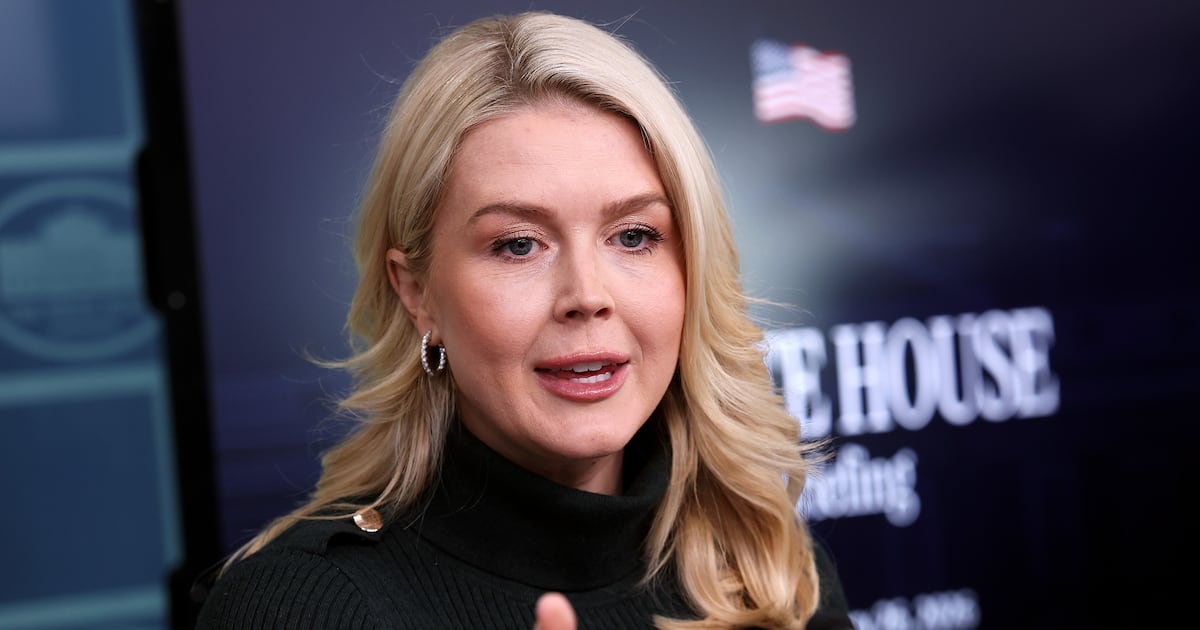Michael Moore could not have chosen a worse time to release a film extolling Europe’s virtues.
I suppose 1939—when goose-stepping Germans were on the verge of plunging the continent into unprecedented war and genocide—would have been a more inopportune moment. And 1914 comes a close second.
But as it stands, 2015 was one of the grimmest years for Europe since the Second World War and 2016 isn’t shaping up to be any better. Recovery from the 2008 crash remains a distant hope in most countries, Eurozone unemployment is over 10 percent (in Spain, youth unemployment has hovered around 50 percent for years), Russia continues to wage war on Ukraine, ISIS has created a revolving door terrorist training program for thousands of European recruits, and political extremists on both left and right are gaining popularity everywhere from Britain and France to Poland and Hungary. Add to this already stormy situation over a million (mostly male) Muslim immigrants who entered Europe last year—a deluge that shows no sign of abating—and you have the recipe for any number of calamities. One of postwar Europe’s most tangible achievements—internal open borders—is already on the verge of collapse as a result of the migrant crisis.
By every measure—whether economic, political, social, or security related—Europe is in bad shape.
And yet here comes America’s most popular and celebrated documentary filmmaker with Where to Invade Next, a paean to European economics, politics, social cohesion and safety. It’s as if we’ve been transported back to 2004, years before the Eurozone, Ukraine, immigration and terrorism crises. A time when authors were writing books with titles like The European Dream: How Europe's Vision of the Future is Quietly Eclipsing the American Dream, Michael Moore was actually relevant, and serious people thought his movies had the ability to swing elections.
Belying its bellicose title, Where to Invade Next isn’t a jeremiad against the military industrial complex most viewers will assume it to be. It has a much more playful conceit. In front of a room of military brass, Moore proposes a novel strategy to enhance American power: rather than send “drones as wedding crashers,” deploy him abroad to “invade” Europe, where country by country, he’ll “steal” their best ideas and bring them home. Over the next two hours, our corpulent, nationally self-abnegating tour guide traipses across the continent interviewing various European politicians, business owners, schoolchildren, regular folks and even prisoners, all of whom explain the advantages of their country’s way of life. Before departing each place he visits, Moore comically plants an American flag.
Where to Invade Next is the cinematic manifesto of those insufferable American expats and tourists who go out of their way to condemn their birthplace as a land of racist, uneducated, overweight, warmongering, religiously fundamentalist yokels (made, ironically, by a man who so impeccably personifies the haughty European stereotype of the obese American slob). Moore has always been more popular in Europe than his native country, where critical reception to his films is mostly determined along partisan lines. Yet ever since his 2004 anti-George W. Bush polemic Fahrenheit 9/11 the Palme d’Or at Cannes, Moore’s movies have seen diminishing returns, both critically and financially, and many liberals have caught wise to his opportunistic shtick. Michael Moore is, for lack of a better word, an America-basher, a man who makes a fortune by confirming the nasty preconceptions about his country held by parochial audiences around the world. Consider Where to Invade Next a love letter to his most ardent and loyal fans on the other side of the Atlantic.
Moore begins his journey in Italy, illustrated with scenes of happy citizens licking gelato in luminous piazzas, sun-kissed youth swimming on beaches, and where people “always look like they just had sex” (this picture of uncomplicated bliss stands in contrast to America, depicted almost entirely through news footage of police brutality and abortion clinic murders). A respectable middle-class couple shows Moore photos from the many exotic places they’ve visited using their seven weeks yearly paid vacation. As they nonchalantly list off other state entitlements like five months’ maternity leave and 13 months’ annual salary, Moore listens with mock stupefaction. Visiting a Ducati motorcycle plant, he marvels at the two-hour lunch breaks afforded assembly employees, who take advantage of the free time to travel home and enjoy a home cooked meal with their families.
In what gradually reveals itself as the film’s central problem, what grates most are the questions Moore never asks (you will find nothing in this film about Muslim immigration for instance). Though she boasts of Italy’s generous maternity leave, the 40-something wife Moore interviews is childless, a fact symbolic of a broader, Europe-wide trend pregnant (pun intended) with meaning. Pronatalist policies like Italy’s have done little to reverse a continental below-replacement birthrate of 1.55 children per woman, the lowest in the developed world. Childbearing is the most basic measurement of a society’s optimism and future health. Europeans have stopped having children, and yet Moore never bothers to ask why.
As for that extra month of salary Italians receive for no reason? It’s bankrupting the country. So is the law that makes it practically impossible to fire anyone in a company employing more than 15 people, which is also a major contributor to the scandalously high youth unemployment rate that, last summer, peaked at a record 44 percent. Italy’s average annual GDP growth over the past 55 years, meanwhile, is an anemic .6 percent. To fudge that number, the Italian government has started to include estimated earnings from prostitution, drugs and arms trafficking, a statistical fix that, it hopes, will officially lift the country out of periodic recession (but one that may annoy la cosa nostra). More than 60 percent of jobless Italians have not worked for over a year; in America, the highest that figure has ever reached was 32 percent, back in 2011. Italy may be a workers’ paradise, but only for those rare souls fortunate enough to have work.
Moore’s veneration of Italy—which forms the bulk of the film’s case for European economic practices over American ones—is telling. Along with other spendthrift Mediterranean states, Italy has essentially been a laboratory for the exact same statist structural economic policies Moore (along with a certain septuagenarian presidential candidate widely supported by people too young to know any better) has advocated across his three-decade long career. Inflexible labor markets, intransigent and powerful unions, titanic social spending, confiscatory taxes: these policies engender economic stagnation wherever they’re implemented. Carried out by successive governments over many years, socialist clientelism is largely responsible for the swelling, long-term unemployed European underclass, which is voicing its frustration by supporting the very right-wing populists Moore claims to oppose.
Next up for invasion is France. “As usual the French offered little resistance,” Moore sarcastically declares, his way of signaling contempt for the archetypically Ugly American, a line that nevertheless struck most of the audience at the premiere I attended (just a few days after the Paris Bataclan massacre) as awkward. This interlude focused on healthy, gourmet school lunches, but what I found more revealing was the answer Moore, who attended the screening, gave during a post-show Q&A.
Asked whether he thought France would adopt PATRIOT Act-style surveillance measures to crack down on Islamist terrorism, Moore responded in the negative. “The French aren’t going to stop being the French,” he said admiringly, as if he had the slightest clue what he was talking about. To be sure, Moore was right, but as is usually the case in such rare circumstances, not in the way he intended.
Like many American progressives who naively conceive of the French as sharing their absolutist civil libertarianism, Moore is apparently under the impression that France is a giant country full of prospective ACLU members. Yet the French state has long had domestic surveillance powers as or more intrusive than those employed by the U.S. government, and three months after the latest terrorist attacks the entire country remains under a state of emergency whose terms—which enable the authorities to enter private residences without having to request a warrant, place people under indefinite house arrest, and “control the press” via prior restraint—would never pass constitutional muster in America.
When France’s National Assembly enacted the measures by an overwhelming margin, 84 percent of French people expressed approval. So Moore is inadvertently correct when he says that, “the French aren’t going to stop being French.” But only in the sense that they will be willing to sacrifice even more freedom for security in precisely the way that self-righteous leftists like Moore mock us supposedly terrorism-obsessed Yanks.
Onward to Finland, where students spend only three hours a day at school and have no homework and yet still post high scores on international rankings, and Slovenia, which offers tuition-free college to any citizen who wants it. Maybe America can learn something from these countries’ educational policies, (though comparing us to Finland—a natural resource-rich country of less than 6 million people—is beyond obtuse; a more accurate method of evaluation would be to stack up our richest dozen school districts against their entire country). I do know, however, that neither Finland nor Slovenia have anything approaching a single one of the 17 American institutions of higher learning that rank in the top 20 of the world’s greatest research universities.
In a departure from his European itinerary, Moore makes an excursion to Tunisia, the only country to have emerged somewhat better than it was before the “Arab Spring.” There, he finds a socially progressive paradise where constitutionally guaranteed rights for women trump those in a country that will never live down its rejection of the Equal Rights Amendment. Moore upholds Rachid Ghannouchi, leader of that country’s Islamist party, as some sort of liberal for confessing that, while he forces his wife to wear a veil, he does not believe the state should mandate all women do so. Moore also quotes the silver-tongued Islamist as saying that homosexuality is a “private” matter, neglecting to mention that Ghannouchi has elsewhere publicly announced his opposition to decriminalizing same-sex relations.
To be sure, I am not of the “America, love it or leave it” school of thought, nor one who says that we have nothing to learn from other countries and cultures. Where to Invade Next strikes a solemn and serious note when Moore visits Germany and praises its approach to Holocaust education and commemoration. Moore is right to argue that Americans could take a lead from Germany in how we educate future generations about the crimes inflicted upon Native Americans, blacks and other minority groups. Likewise, his segment on Portugal’s drug policy is enlightening, as are some of the points he makes about racial disparities in the criminal justice system. But these are issues already being debated, much more meaningfully, by Americans and their political leaders. Moore is late to the game and doesn’t have much new to add.
Nevertheless, it’s appropriate that Moore would make Where to Invade Next so late in his career. Using the common thread linking all his previous films, it recapitulates the message that animates his entire life’s work: America is a horrible country. It may be the job of the socially conscious documentarian to hold up a mirror to society and reveal its faults. But Moore is not only incapable of seeing America’s virtues; he’s incapable of realizing his mirror is cracked.
Entirely reasonable criticisms of American health care led him to glorify Cuba’s communist dictatorship (2007’s Sicko); hatred of George W. Bush steered him to romanticize Saddam Hussein’s Iraq as an idyllic land of kite-flying children (2004’s Fahrenheit 9/11); and now the frustration he feels about various American social maladies manifests itself in bizarre tribute to the Finnish education and Norwegian penal systems. Berating American racism and militarism, he completely ignores their European obverses: a culturally suicidal open door to limitless Muslim immigration (which hardly anyone dare criticize for fear of being called a bigot) and collective fecklessness in the face of Russian belligerence (which hardly anyone dare criticize for fear of being called a warmonger).
Moore’s donning of ideological blinders pre-dates his cinematic career. In 1986, after only four months serving as editor of Mother Jones, Moore was fired partly over his refusal to publish an already-commissioned article that didn’t conform to his idealized view of the Nicaraguan Sandinistas. (According to the magazine’s co-founder and then-publisher Adam Hochschild, Moore blamed his termination on “Jewish” and “Zionist” forces).
Where to Invade Next ends with Moore joining a friend for a walk along the Berlin Wall, where the two marvel at how it took just a few people chipping away at the edifice to set in motion a chain of events that tore the whole thing down. This part of the movie is deeply weird not only because it grossly misinterprets the end of the Cold War as the initiative of a handful of brave, ordinary Germans who just decided one day that they wanted the Berlin Wall to fall. Ignoring the grand forces of history, which would have compelled him to acknowledge aggressive anti-communist policies like the Reagan defense build-up and arming of the Mujahedeen in Afghanistan (the latter of which he condemned in Fahrenheit 9/11 after falsely conflating it with support for al Qaeda ), as well as the inherent unworkability of socialist economic ideas he favors, Moore entirely ignores the diametrically opposing value systems which defined that ideological struggle as one between freedom and tyranny.
The hard left, anti-anti-communist circles from which Moore hails have never been comfortable talking about the Cold War in such terms, given their deep ambivalence about the American system. Moore’s position in the long, twilight struggle against communism can most charitably be described as that of a bystander, though more accurately a fellow traveler, given that his most significant contributions to the foreign policy debate at the time were defenses of Soviet clients.
“There are always simple answers to these things,” Moore intones at the end of the film. Moore’s answer to every political, social or economic problem is “simple”; it’s why his movies are such a hit with young people. Promising “simple” answers to complex and multidimensional issues, however, is a mark of the demagogue, the sort of leader America has (with the exception of Andrew Jackson) blessedly avoided in its nearly 250 years as a constitutional democracy.
The same, however, cannot be said of Moore’s favorite continent, a place that has continually fallen for the siren calls of agitators promising easy solutions in exchange for unlimited powers. Moore’s tempting guarantees of limitless welfare state capability and Manichean parables pitting a noble, benighted poor against an evil, oppressive rich ought send shivers down the spine of anyone remotely familiar with the turbulent contours of European history. If there’s one thing audiences should take away from this film, let it be that the rabble-rousing and manipulative charlatan at its center has finally achieved that goal to which he’s long aspired: He’s become a proper European.
Updated 2/16/16: A previous version incorrectly stated that Farenheit 9/11 won the Academy Award for best documentary. We regret the error.






